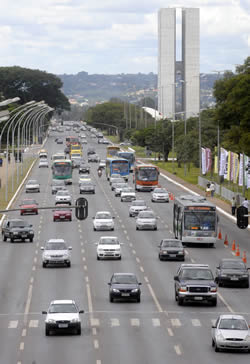Energy Consumption in the Transport Sector Grows in the Region
Work area(s)
Topic(s)
According to an ECLAC study, all of the region’s countries more than doubled their energy consumption in the transport sector between 1990 and 2010. There is therefore an urgent need for a new approach to design suitable policies that prioritize energy efficiency.

The constant worldwide rise in energy consumption (especially growing demand for fossil fuels to support the movements of people and goods) is a global concern to all governments. Latin America and the Caribbean is no exception, and urgently requires a new approach to design suitable policies that prioritize energy efficiency - according to a recent ECLAC report.
Transport of people and goods currently represents 20% of total primary energy consumption worldwide, and is responsible for a quarter of CO2 emissions. In Latin America, final energy consumption for transport in Latin America in 2011 was over 1.5 billion barrels of oil equivalent (BOE) (or more than a third of total regional consumption).
This is according to the document Energy efficiency and mobility: towards a "greener" economy in Latin America and the Caribbean (in Spanish), presented by ECLAC at the 4th Policy dialogue on energy efficiency, which was held in Mexico City on 21 and 22 November 2013.
According to the report, all of the region's countries more than doubled their energy consumption in the transport sector between 1990 and 2010. The largest rise in this period was recorded by Panama (with 390% growth), followed by Costa Rica (294%), Bolivia (287%), Guatemala (273%) and Honduras (257%). The countries with the smallest increases were Colombia (141%), Argentina (155%) and Jamaica (170%).
The significant rise in the number of cars per inhabitant has been the main factor in this pattern. This situation, combined with a road network that has not grown in line with the increase in vehicles, has made mobility into a high-priority challenge for those running many cities. In the large cities of Latin America, congestion has had high economic costs and negative impacts on the quality of life of inhabitants (including an increase in air pollution).
Based on the Sustainably Energy for All (SE4ALL) strategy launched by United Nations Secretary-General, Ban Ki-moon, in 2012, ECLAC uses its document to present a comprehensive overview of energy efficiency and mobility.
The proposals are based on the ASI approach (which stands for Avoid, Shift and Improve). The aim is to Avoid journeys and increase system efficiency; Shift to better means of transport to increase journey efficiency; and Improve fuel performance to increase vehicle efficiency.
The Commission adds that introducing fiscal measures (such as appropriate fuel taxes, eliminating fuel subsidies and prioritizing research and development incentives and funds) may encourage markets to seek out energy efficient solutions.
ECLAC also highlights the need for close cooperation between energy and transport experts to identify the best international practices aimed at increasing the efficiency of mobility. The idea is to come up with solutions that match the local context in order to reduce energy consumption without jeopardizing well-being and social and economic development.
Related content

Type
Contact
Public Information Unit
- prensa@cepal.org
- (56 2) 2210 2040